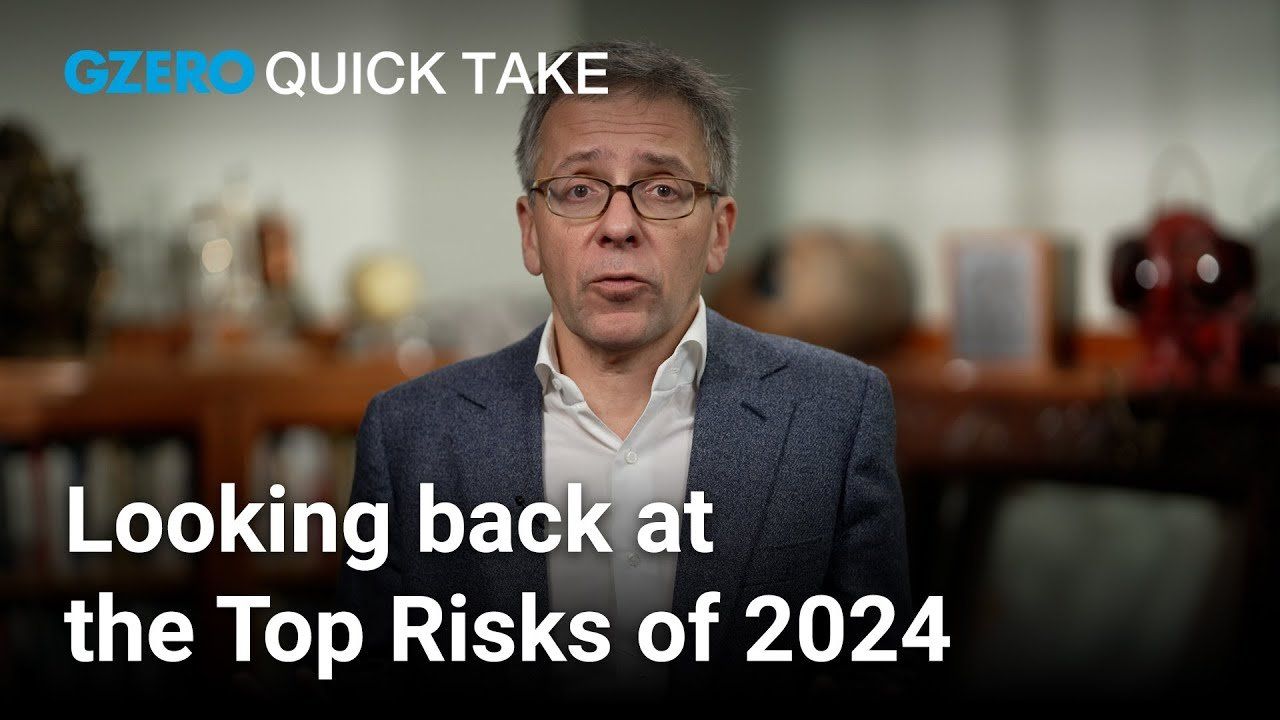December 22, 2024
Ian Bremmer's Quick Take: As 2024 comes to a close, we always look back on our Top Risks. How we did at the beginning of the year. I back in January, referred to this as the "Voldemort of years," at least geopolitically. The year that must not be named because of three major conflicts that we expected were going to only get worse over the course of the year. The Russia-Ukraine war, the war in the Middle East, and the war between the United States and itself. Those absolutely played out.
First, the risk on Russia-Ukraine, where we said that Ukraine would effectively be partitioned. Not a popular thing to say back in January, and not something that we were hoping for. Just something that we believed was going to happen, even irrespective of how the US elections turned out. The fact that Ukrainians were going to be much more overstretched in the ability to fight. The fact that the Russians would be able to maintain the war machine, and the fact that the Europeans and the Americans were increasingly tiring of a war with lots of attention in other places.
All of that meant that Ukrainians would increasingly be desperate. And we really saw that in particular with this spectacular Ukrainian attack into Kursk taking Russian territory, but needing 40,000 of their troops to accomplish it away from their front lines. As the year comes to a close, Ukraine is losing territory faster than at any point since the beginning of the war. And they increasingly recognize not only that they need to start negotiations, but they're going to have to end up trading some land for peace and for security guarantees from the West. So indeed Ukraine today, de facto partitioned.
Number two, the war in the Middle East, which we believed was going to expand significantly. At the beginning of the year, we were talking about Gaza. Now of course, we're talking about the 'Axis of Resistance,' a year when in Yemen the Houthis were popping off rockets and missiles against civilian tanker traffic going through the Red Sea and also against the United States and other military assets in the region, and the Americans and others hitting them back. We saw the war open to include Hezbollah and Lebanon. We saw the war also threaten to bring Israel and Iran together directly as they exchanged fire against each other and as the Israelis were able to decimate Iran's proxies.
Some good news on this front. First of all, the fact that ultimately the United States, Israel, and most importantly, Iran, showed restraint and risk aversion in what would've been a much more devastating fight. And what would've led oil prices to go well over a hundred if that war broken out. That did not occur. And also the fact that the Israelis have been able to show military dominance, which meant that there is no more effective 'Axis of Resistance' at the end of this year. In fact, the big surprise that not only did the war expand, but Assad is gone. Not because of Obama who said that over 10 years ago, but rather because they were unable to respond to HTS supported by Turkey, a rebellion against Assad, and the Russians, and the Iranians. Assad's support base were inadequate to keep him in power. He now sits in Moscow.
And now finally, the US versus itself. A year of only more significant division and polarization inside my own country, the United States. And we've seen that play out. First of all with a Biden that was running for the presidency and had no capacity to serve for another four years, refused to step down, was finally essentially forced out, forced to step down by everyone around him, including former President Obama, former speaker Pelosi, and all of the rest. On the Trump side, two, not one, attempted assassinations, one by this much. And if that had occurred, we'd be in a hell of a lot more difficult position now as a country. The election did go off without a hitch, and was accepted as free and fair, thankfully. And now the United States looks forward to a new president. But the divisions inside the US, the weakening of America's political institutions only growing over the course of 2024.
So those were our top three risks. You can look at all 10, and see how we did go back and check it out on the link that we have here. And also take a look in early January. Watch out for our Top Risks of 2025. It will be something you do not want to miss.
From Your Site Articles
- Eurasia Group’s Top Global Risks 2024 ›
- Why 2024 is the Voldemort of years ›
- 2024's top global risks: The trifecta of wars threatening global peace ›
- A world of conflict: The top risks of 2024 ›
- Ian Bremmer explains the 10 Top Risks of 2025 - GZERO Media ›
- Unpacking the biggest global threats of 2025 - GZERO Media ›
- Podcast: The Top Geopolitical Risks of 2025, a live conversation with Ian Bremmer and global experts - GZERO Media ›
- Top Risks 2025: America's role in the crumbling global order - GZERO Media ›
More For You
Most Popular
Our sharing success program reflects BofA’s commitment to teammates and driving economic opportunity for employees and communities. The Proof: Since 2017, our program has awarded nearly $6.8B to employees—recognizing their contributions and investing in their future. Learn more.
WATCH THE REPLAY: At this year's World Economic Forum in Davos, Switzerland, our Global Stage panel discussion will examine the growing infrastructure around AI, how countries are tackling AI adoption, and the ways in which local and supranational industries might benefit from this rapidly accelerating technology. Watch at gzeromedia.com/globalstage
© 2025 GZERO Media. All Rights Reserved | A Eurasia Group media company.
